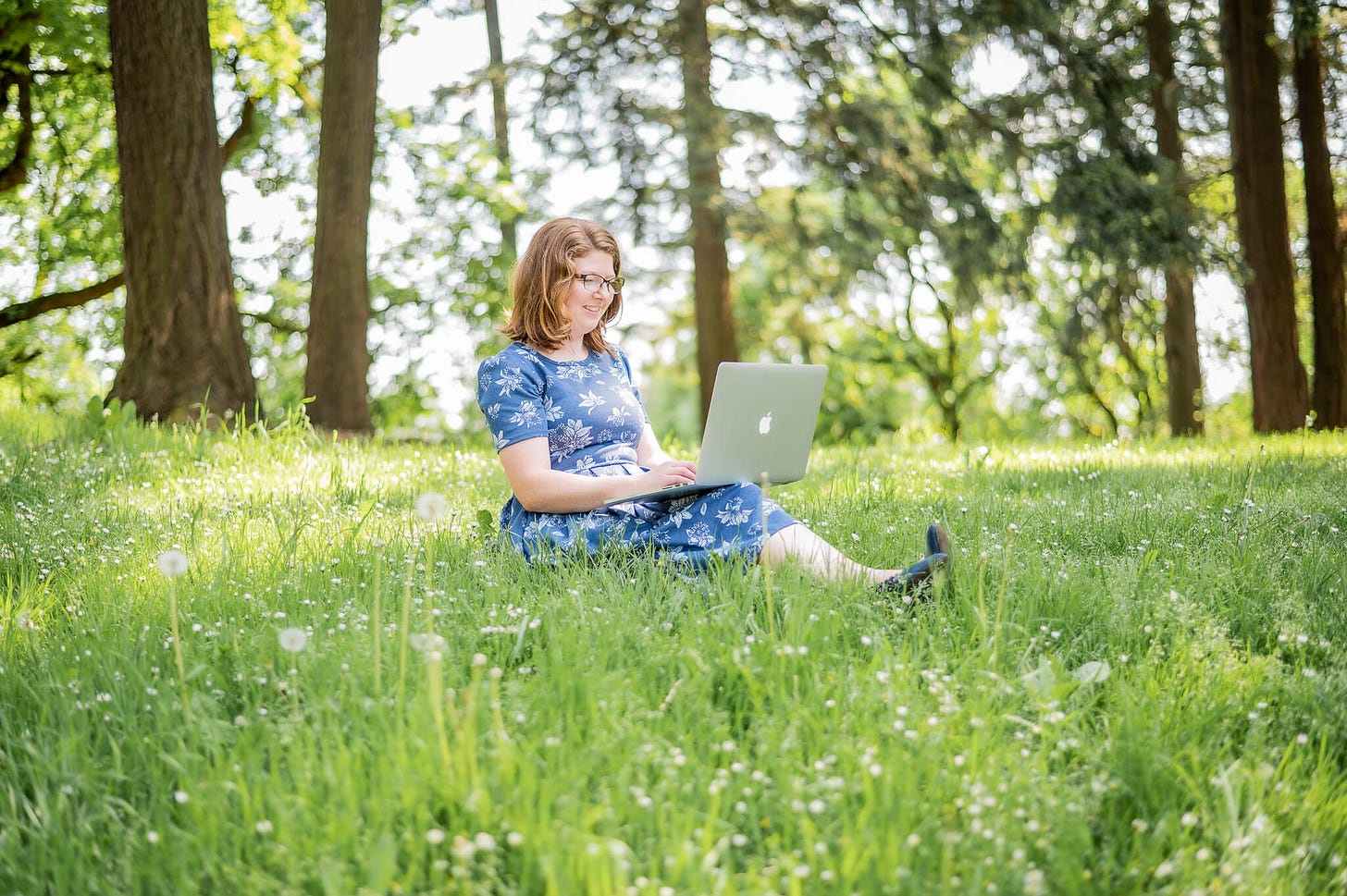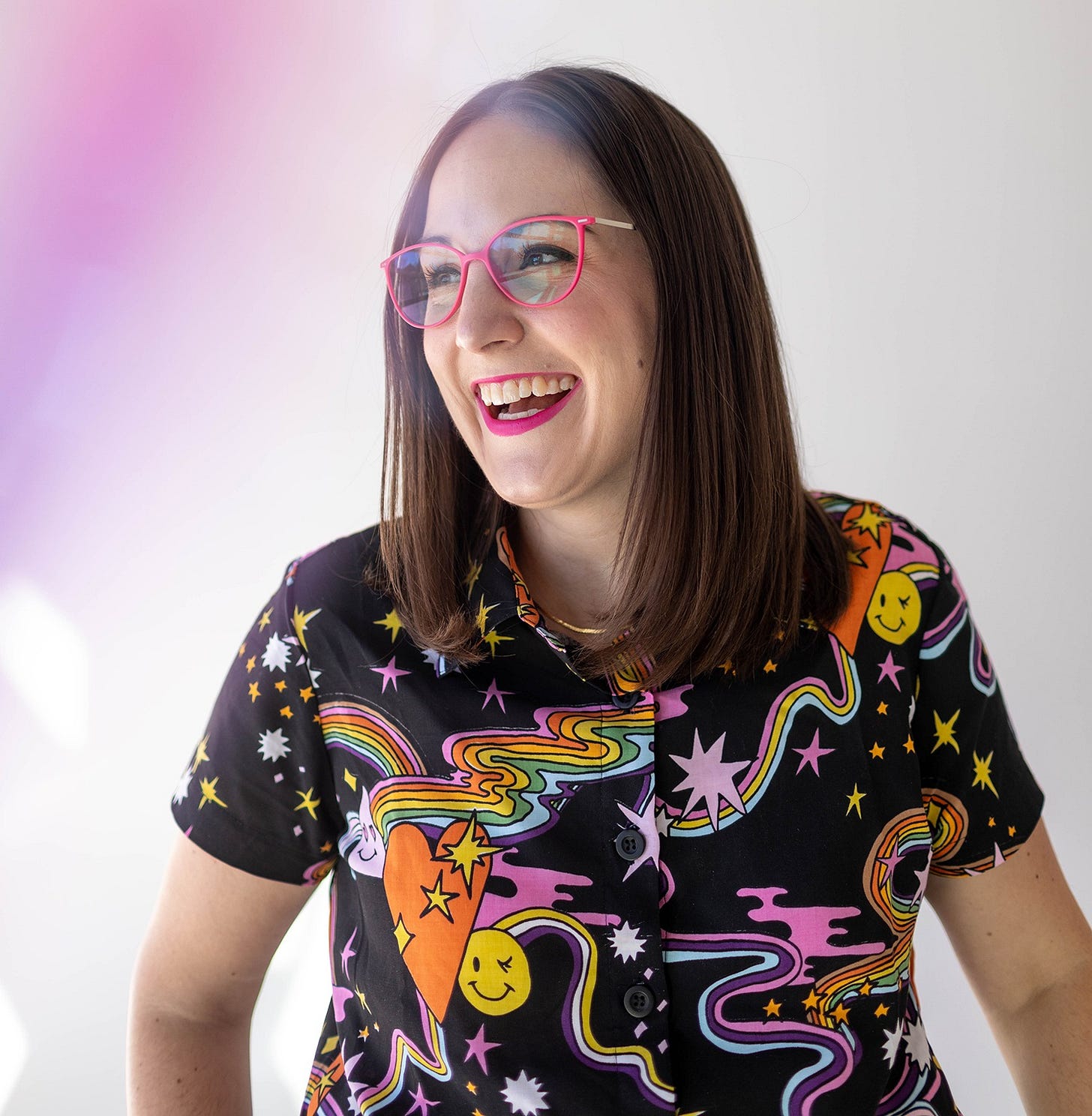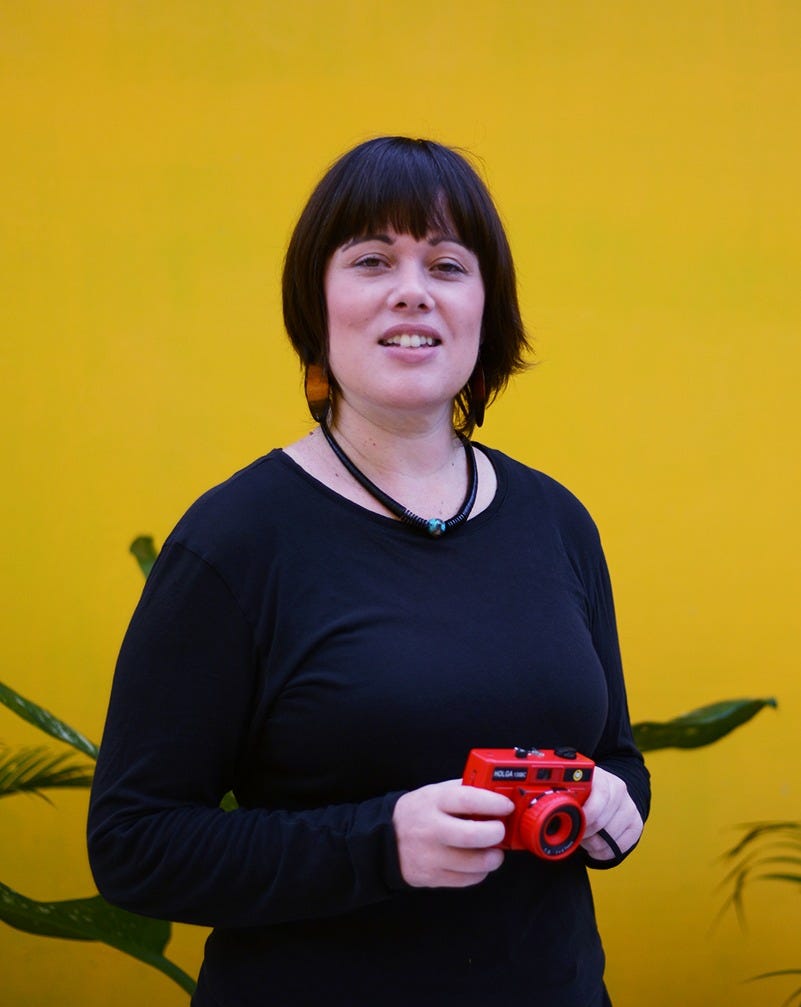Small business, big conscience
Real stories from conscious business owners: guest post by Willow Paule
Is capitalism really having a midlife crisis? While the corporate giants polish their ESG reports and craft sustainability manifestos, something more interesting is happening at ground level. In coffee shops, design studios and home offices, a quiet revolution unfolds - one led by small business owners who decided that ‘business as usual’ has become an unusually bad business model.
If you've ever wondered whether it's possible to turn a profit without losing your soul (spoiler: it is), or if making the world marginally more decent could be a viable business strategy, you're in the right place.
Guest writer Willow Paule collected field notes from the frontlines of conscious commerce - real stories from business owners who are rewriting the rules. Whether you're curious about dipping a toe into more ethical waters, or ready to dive into purpose-driven business, these women can show you how they’re making it work.
Let’s hear what you found out, Willow Paule …
What do conscious business owners do differently?
If you’ve ever worked in an office, you probably have developed a long list of things you didn’t enjoy about the environment. But the cool thing about being an entrepreneur is that you have the freedom to structure your business how you like. You can bring your values into your business and become a conscious business owner who doesn’t operate with a business-as-usual mindset.
For this post, I spoke with six conscious business owners and entrepreneurs to ask for their tips and learn more about their conscious business practices. I wanted to know about their personal and business lives, and how they practice conscious business ownership.
But first, let’s get a working definition of the term conscious business.
What is a conscious business, anyway?
A conscious business prioritises ethical practices, sustainability and social responsibility, while striving to create positive impacts on the community and environment. It emphasises purpose beyond profit, fostering a values-driven approach to business operations and decision-making.
Is a conscious business just a fancy term for a non-profit?
No, a non-profit relies on donations to run their enterprise, whereas a conscious business is paid by other individuals or businesses.
Here are a few more ways to identify a conscious business.
Values-based model
A conscious business has defined values; the business stakeholders only make deals that are aligned with their values.
Social responsibility
A conscious business considers the ramifications of its actions. Conscious business owners contribute time or money to efforts or community programmes they believe in.
Environmental responsibility
A conscious business is aware of how each aspect of its business operations affects the environment and works to minimise its carbon footprint.
They have a higher purpose beyond money
A conscious business has a clear mission besides profit.
What does being a conscious business owner mean to you?
Web and graphic designer Kritika Rao said, “I believe a conscious business owner looks at their business and profits as a part of a bigger picture. They live and work in harmony with nature and society. They condemn cut-throat competition and indulge in healthy growth while uplifting the environment and society around them.”
Consultant Katie Helms says, “... it means being aware of the cost of my whiteness. It means using my privilege and voice to speak up in the face of injustice whenever and however I am able to.
It means also, leveraging my power and aiming my reparations appropriately. It means being willing to face uncomfortable truths and have hard conversations. It means being able to recognise that people who look like me are a global minority.
It means being willing to listen more than I speak and to use my voice to amplify the voices of the disempowered.”
“It means being willing to be the holy perturber, the grain of sand that irritates to create a beautiful pearl of change.”
Brand designer Renee Garcia also mentions community. “Being a conscious business owner means thinking about how my actions and those of my business impact the world around me. By focusing on building up communities and nurturing intentional relationships, we can create a more supportive system that promotes wellness and sustainability.
I don’t want to succeed on my own, I want my friends, neighbours and strangers to succeed too.
Life is much too hard to keep pushing one another down, so I want to be someone who reaches down to lift someone up.”
Brand strategist and designer Kristy Black cautions that, if we’re not conscious, we can perpetuate harm unintentionally.
“If we, as business owners, don't make a concerted effort to use our businesses to create the world we want to see, it can be easy to accidentally uphold harmful systems. To be a conscious business owner means to closely examine the way we operate in order to ensure we are doing everything with intention. There are many business practices that are "industry standard" that perpetuate harm and unethical behaviour and just because they have long been the standard doesn't mean they need to remain that way.
Developing a strong, values-led business and operating in integrity with those values is the key to being a conscious business owner (and just so happens to be what builds a strong brand as well).”
How does running a conscious business contribute to your personal sense of fulfilment and purpose?
Renee says, “Creating a business with foundations built on my personal values helps me feel like I’m making an impact on the world on a deeper level while staying connected to who I am as an individual.
My business evolves as I change and grows alongside me.
This nourishes my soul and helps my heart feel full knowing that I’m supporting do-good people who are chasing their own dreams.”
Kritika adds, “I firmly believe if we want to go fast, we go alone. But if we want to go long, we go together. If my success can mean growth for other businesses and vice versa, all while respecting nature and humanity - is there a better way to do business?”
Social media manager Claire Matz observes, “Getting to work with clients from different fields and countries, connecting over our shared values of sustainability, ethical business, and conscious living is such a joy.”
Kristy Black confides, “During my previous experience working for others, I was written up and quieted for speaking up against unethical practices and vowed to create a business that better supported my own values and morals.
In recent years, I've helped develop brands for many service providers in the wedding industry who want to break free from the gendered language that still dominates the industry and it has been SO refreshing! Helping folks develop their own values-led and heart-centered brands that create a more inclusive and supportive world for ALL people brings me substantial amounts of joy.”
Thought partner Angela Ellison says, “My business brings me fulfilment and purpose through connections with like-minded individuals. Working with kindred spirits across distances, sharing values and goals, has been a joy. These collaborations inspire creativity and meaningful conversations, and I learn a lot from others who genuinely care about the planet.
I've enjoyed networking through Green Marketing Academy events, Willow’s Creative Hour events, the Ecopreneur Community, and being part of 1% For The Planet. These experiences have also been heartwarming, connecting me with conscious creatives dedicated to making a positive impact.”
How do you balance profitability with your commitment to owning a conscious business?
Renee counsels, “At the beginning stages of your business journey it can be challenging to find this balance.
Being a young entrepreneur, I’ve had a few instances where I had to decide whether to focus on building financial stability or niching down to work only with aligned businesses. Sometimes we have to make hard choices, at times following our heart and other times thinking more with our head.
The reality is that, even as conscious business owners, we have bills to pay and a life to sustain. Keeping a business alive and thriving is no easy task and sometimes you have to take the job that isn’t the best fit in order to continue offering your services for ideal clients further down the line.
At some point, my mindset changed from one of, “I can only work with my ideal client” to, “It’s okay to take on work that isn’t a perfect fit.” Keeping in mind that the more I profit, the more I can redistribute funds through donations to organisations that I want to support and the more flexibility I have to take on volunteer design work.
If we can’t pay our bills we might have to shut it all down and leave the business behind. I’d rather take on a few projects that help me build a strong foundation than turn back to the corporate world. Especially when they allow me to invest in my business or offer discounts for an aligned business later on.
As with everything in business, we all need to do our own reflection to determine what is the right decision for us. My reality may not be the same as yours, but if this helps you feel like you’re not a failure for taking on something that wasn’t the best fit, then I’m thankful I shared.“
Katie notes, “I'm still working on the profitability part. The conscious part isn't a choice. It's a necessity. It's not an option to be any other way. … from this seat, if I'm not conscious, I'm useless, dead, a danger to others.”
Kristy argues, “Profitability and owning a conscious business are not inherently at odds with one another.
So many entrepreneurs bring all of the unhelpful at best (and harmful at worst) practices they acquired from schooling and the workplace into their own businesses. One of the ways I see this manifest most often is in entrepreneurs exploiting their own labour when they buy into the hustle culture mentality.
If you are actively embodying your values in all that you do and are charging a fair and profitable wage while delivering an exceptional product, you can have the best of both worlds.”
Which brings me to my next question.
How do you create a positive and supportive workplace culture for yourself and any people who work with you?
Angela has some great thoughts about this. “Being a solopreneur means I’m at home with my fluffy co-worker (or boss), Mako. I try to tend to his every need while keeping up with my own business to-dos. It’s tricky to balance, but I’m learning!”
On a more serious note though, I deeply value the relationships I have with my clients and those that interact with me in collaborative spaces. I prioritise the time and energy of other people.
For example, one of my values is accessibility. In marketing materials, I check colour contrasts and add ALT texts, and use diverse imagery to reflect inclusivity. I also have free support available through my blog posts and resource page created specifically for sensitive solopreneurs.
I maintain transparency with clear pricing and offer multiple contact points for client comfort. Additionally, I have thoughtfully planned and automated client services, supplemented with warm and explanatory videos, to ensure ease of communication and access to information.
As for myself, I have learned to be honest with my own capacity given that my business relies totally on my energy. I have carved out certain days for client work and also time where I can decompress.
I also have completely adjusted my marketing structure to be more gentle on my body, instead of giving into hustling culture. It feels good to build my own business ecosystem in a way that works for me despite what others may think.”
Claire also talks about how she honours her own needs. “Working from home and setting boundaries in terms of work hours has done wonders for me.”
Kristy remarks, “The most transformational thing for me has been maybe the one that seems the most obvious - remembering we're all just humans. So much of the business world functions on this idea that everything is critically important and urgent (and unless your work saves lives, it absolutely is NOT the most important). How many of us have had day jobs that treated seemingly normal business tasks as "fire drills" that needed immediate attention?
In order to avoid the unnecessary hustle and stress, I try to treat everyone like a human, myself included. We all contain multitudes, occasionally must fight unseen battles, and are living under the effects of late-stage capitalism as multiple genocides continue to unfold. Meeting ourselves and others with grace and compassion makes the world of difference.”
What are small but meaningful ways to reduce the environmental footprint of your business?
Claire says she offsets her business’s carbon footprint. She recommends looking for green web hosting companies that offset your carbon footprint by planting trees, or using Ecosia, a web browser that plants trees when you use it.
Kritika recommends web hosting on renewable resource platforms to clients, and hosts her own website on one.
And, Katie says, “I walk to my desk. I keep the lights off in my office when I'm not on calls.
The AC vent in my office is closed to redirect the air elsewhere in the house. I buy refurbished electronics and appliances whenever possible. I don't buy brand new devices, my laptop is over ten years old.
I don't use disposable cups for beverages. I have a roll of reusable, washable handkerchiefs in a Kleenex box on my desk.
I use old vegetable bags as trash bags in my office trash can. I do not use harsh chemicals or expellerants to clean my office surfaces and floor.
There's no microwave or keurig here.
The majority of my work is done virtually so clients aren't commuting to my office with fossil fuels.”
Renee says, “I work at home and often have virtual meetings with my clients instead of meeting in-person, especially when they live across the country - shoutout to my East Coast clients! No unnecessary traveling here!
• Chose a greener website host
• Use reusables: bags, storage containers, water bottles, etc.
• Repurpose and repair when I can (and I’m learning new skills like visible mending)
• Consume and use what I have and limit new purchases
• Share eco-friendly print options with clients and I’m mindful of my paper choices when I print materials
• Optimise images for use online and clear old files
• Started a vermicompost
• Continue learning and growing, thank you to The Green Marketing Academy for helping me set such a solid foundation.
Angela says, “Being an online entrepreneur allows me to work at home and use my car minimally.
While my lack of commuting reduces my overall footprint, I have become more aware of the impacts of data stored online (thank you Ecopreneur Community). For example: I regularly delete emails in my inboxes, routinely remove unnecessary data from my computer files and size my images appropriately for my website to reduce the data.
I periodically evaluate all the subscriptions I have and software I use, to ensure I am intentionally using the tools I have and that they are worth my investment. I am continually learning about being a more conscious online entrepreneur and open to finding new ways to reduce digital waste.“
How does your business contribute to the local community or society?
Claire says, “I donate 1-2% of my earnings to various causes, both international and local, whose advocacy work for marginalised communities, animals and the environment I admire.”
Kristy shares, “I help develop and amplify values-led brands positively impacting the world and their own communities. I donate to Colorado-local organisations that support LGBTQIA+, black and indigenous people in my area. I've also had the great pleasure of volunteering at a local disability-inclusive pride event and hosting a letter-writing party to create encouraging cards for those receiving gender-affirming care.”
Renee says she volunteers at local, earth-focused or purpose-driven organisations. She also thrifts, trades and passes items on to new homes. Plus, she attends events hosted by fellow business owners to support them on their journey. “Sometimes these are networking events and other times they look like food pop-ups, art gallery openings, etc.”
Angela talks about her marketing style. “One of the ways I hope to impact society and even my local community is through shifting our sales culture. Instead of using capitalistic tactics like urgency and scarcity to make sales, my business is about creating genuine connections. I have committed my pledge on The Ethical Move as a sign of my contribution to our human network.
I envision a world where the pressure to buy is replaced with a space for thoughtful consideration and intentionality. I believe it is possible to be successful without using these high pressure tactics.
These are also the same tactics and patterns that have led to exorbitant waste and debt on our planet – I cannot participate in that way of selling.
This belief has guided how I approach the aspect of marketing. I deeply value autonomy and consent. These two values have been the reason why I prioritise longer form content like blogging (instead of short form quickly consumed and short-lived content like on Instagram), as well as promoting my writing on Pinterest.
I’ve recently joined Substack as a way to connect with other creatives. Marketing in this way provides free support to other business owners, while also giving them a gentle invitation to take next steps to connect with my business.
In all of this, I believe that people are curious enough and that they will naturally seek out what they need when they are ready. Resonance is a powerful and organic way to grow a business.
My intention is to empower my clients and anyone that interacts with my business to make choices aligned with their true needs and values, rather than giving into fleeting impulses. We can create a culture of mindfulness in consumption, where each purchase is a conscious and meaningful act.”
What it really means to be a conscious business owner
Hopefully reading about these six conscious business owners' approaches makes the whole topic clearer. And maybe these entrepreneurs sharing more about their practices makes the idea of becoming a conscious business owner more feasible for you? Consider expanding on some of their ideas, and mixing them with your own approaches, to discover the conscious style that works for you.
Thanks for reading. I’d love for you to leave a comment below about one thing you’re doing to approach business ownership in a conscious way.
Who wrote this post?
I’m Willow Paule, and I’m a content specialist. I share in-depth articles about content strategy, content repurposing, working from home and owning an ethical business on my blog. I believe your content should help you stay more visible, connect with soulmate clients and step off the content creation hamster wheel so you can spend more time away from your computer.
Back to Sue
Check out my profile of Willow Paule - she was one of the 25 for 25 midlife women I featured on my alternative advent calendar.
Interested in writing a guest post for Ink Tank?
Guest posting is a great way to build your own audience. I know, because I’ve done it myself. If you've got things to say about building a business in midlife, I’m happy to hear from you.
Just email me at inktank@substack.com. Doesn’t have to be anything fancy. A paragraph about your proposed post, and maybe a link or two to something you’ve already written.













Hi Sue! Thank you so much for sharing our collaborative article with your audience. It's been an honor to be part of this important conversation. ~Angela Ellison
I don't know about privilege, what does that mean.